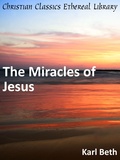Karl Beth
German historian of religions and Christian thinker
Biography
Karl Beth studied at the University of Berlin in the 1890s (under Adolf von Harnack, Otto Pfleiderer, and Wilhelm Dilthey), where he obtained his Ph.D. in 1898 with a dissertation entitled "Die Grundanschuungen Schleiermachers in seinem ersten Entwurf der philosophischen Sittenlehre". He became an instructor of systematic theology at Berlin in 1901. Five years later he moved to Vienna and served at the university there, first as a lecturer and from 1908 onward as a full professor. The political developments that in 1938 brought an end to his academic career in Europe led him to emigrate to the United States in the following year. He served on the faculty of Meadville-Lombard Theological School in Chicago from 1941 to 1944, teaching the history of religions, a field that was a primary concern for him at several points in his life.
As early as 1901 in his inaugural address at Berlin, he argued that the study of the general history of religions?not merely the study of the religious environment of early Christianity?was necessary for understanding and defining the essence of Christianity. Shortly after he gave this address, he received a travel stipend that enabled him to visit areas around the Mediterranean under Greek and Turkish control, and the acquaintances he made with Christians living in these regions led to his publication of an account of Eastern Orthodox Christianity that opened the way for a new understanding of it among European Protestants (Die orientalische Christenheit der Mittelmeerländer, 1902; see also his article "Orthodox-anatolische Kirche" and several related entries in the second edition of Religion in Geschichte und Gegenwart, 1929–1932).
In the decade following 1902 much of Beth's work focused on the issue of Christianity and modern thought (e.g., Das Wesen des Christentums und die moderne historische Denkweise, 1904, and Die Moderne und die Prinzipien der Theologie, 1907). During this period he also dealt with specific issues such as the significance of the notion of evolution for Christian theology (comparing it, in Der Entwicklungsgedanke und des Christentum, 1909, with the significance of the idea of logosfifteen hundred years earlier) and with historical-critical questions regarding Jesus (in Hat Jesus gelebt?, 1910).
In the following years some of his major studies were again in the history of religions, particularly his book on religion and magic, Religion und Magie bei den Naturvölkern: Ein religionsgeschichtlicher Beitrag zur Frage nach den Anfängen der Religion(1914), in which he stresses Ehrfurcht ("reverence" or "awe") as a constituent element of religion, draws a sharp contrast between religion and magic, and assumes the existence of a historical stage preceding both. (He rejected James G. Frazer's hypothesis that magic was the forerunner of religion.) Also significant were his Einführung in die vergleichende Religionsgeschichte(1920) and his study on faith and mysticism (particularly within Christianity), Frömmigkeit der Mystik und des Glaubens(1927).
A third major field of involvement for Beth was the psychology of religion. He helped to establish the Research Institute for Psychology of Religion in Vienna in 1922, was editor of the Zeitschrift für Religionspsychologiefrom 1927 to 1938 (during which period he published more than twenty articles in that journal), and was instrumental in the organization of the First International Psychology of Religion Congress, held in Vienna in 1931 on the theme of the psychology of unbelief.
